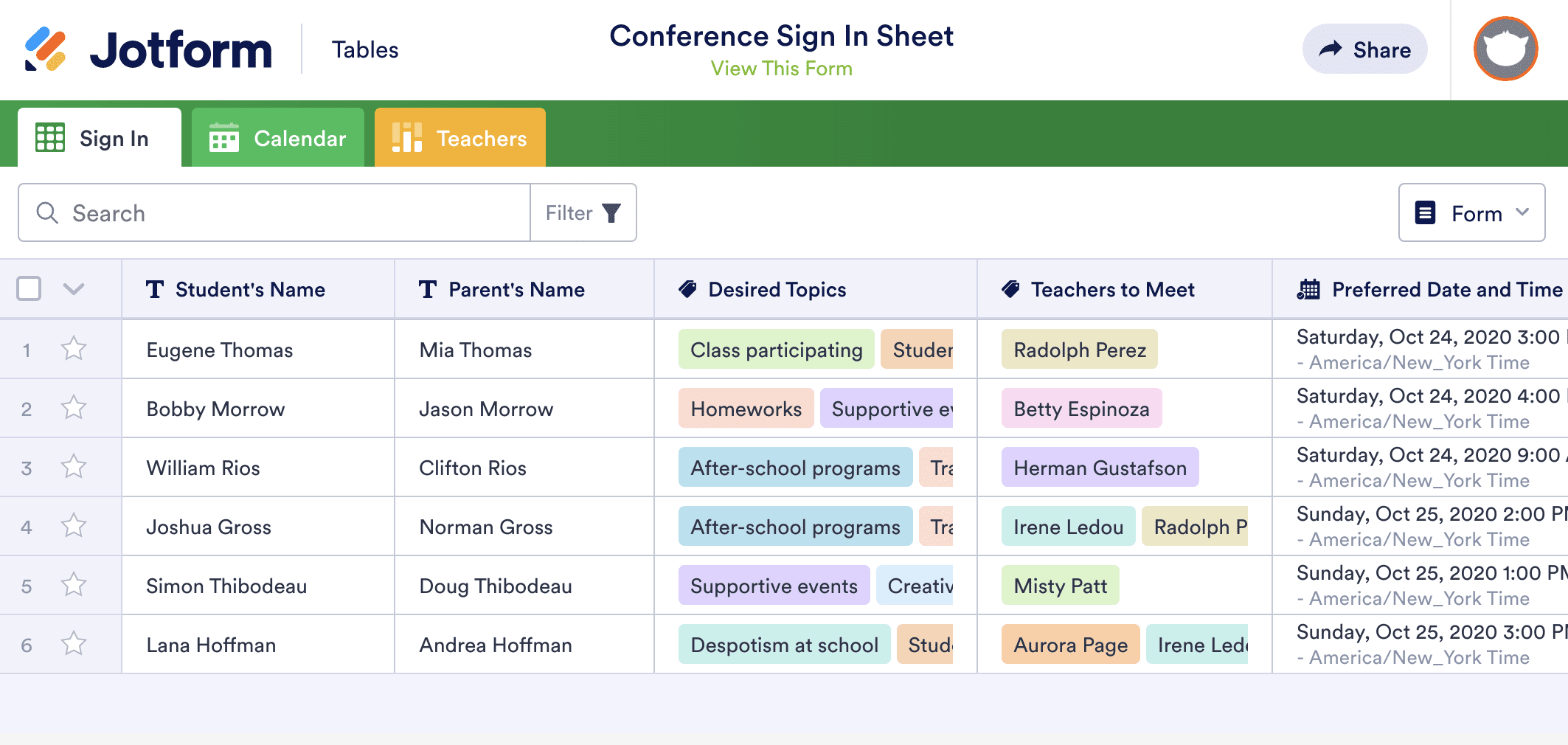Parent-teacher conferences fill parents, teachers, and students with dread.
Students get nervous at the thought of their parents and teachers discussing them. Parents get nervous about what the teacher may tell them about their children. Teachers get nervous about parents getting defensive. That nervousness makes for very stressful meetings.
The good news is that there are tactics teachers can employ to mitigate that stress and keep parent-teacher conferences simple and productive. Digital tools can support those endeavors.
1. Make a schedule and stick to it
One of the most difficult aspects of these conferences for parents, especially working parents, is scheduling.
How can you relieve some of the anxiety? Create a calendar that allows parents to choose a time that best fits their schedules. Let parents choose from multiple different times, and stress to them the importance of keeping their appointments.
A digital scheduling tool can be a great way to help you make a schedule. Instead of sending home letters, you could send Jotform Cards to parents. Once you have your schedule, be prepared to stick to it. A meeting agenda for each conference can help you accomplish this mission.
Pro Tip
Make the most out of your parent-teacher conferences this year and try Jotform’s ready-made education templates today.
2. Create a meeting agenda and share it with parents
Nothing throws meetings off faster than ad lib conversation. While you certainly want to get to know your students’ parents, it’s important to keep these conferences on time out of respect for everyone.
To do this, teacher and responsive classroom professional development specialist Margaret Berry Wilson suggests creating an agenda that will help keep the meeting on task. Be flexible if the parent raises a concern, Wilson says, but create an agenda that keeps the meeting moving forward.
To ensure that everyone follows your agenda, send it to parents ahead of the meeting so that they know what to expect from the conversation. By using a platform like Google Docs, you can easily email documents to parents that they can edit (or not, depending on your preference).
Classroom communication tools such as Remind and Bloomz can also help you easily share schedules and communicate with parents ahead of conferences.

3. Offer the option for video conferencing
Some parents will genuinely struggle to find the time to attend a parent-teacher conference.
Schools need to modernize their options for connecting with these parents, says Jennifer L.M. Gunn, educator and cofounder of the annual EDxEDNYC Education Conference.
Consider offering these parents a video conference as opposed to an in-person meeting. By doing so, you will make it easier for them to find a time for a productive call. Instead of scheduling an entire day around a conference time, they can let you know when they have a break and an opportunity to chat.
There are many free video chat tools available, such as Skype in the Classroom or any mobile device’s video chat software.

4. Solicit parent input before a meeting
Knowing parental concerns and conversation topics ahead of the conference can help keep the meeting on time.
Carolyn Fruin, lead curriculum writer and course developer in the School of Education at Capella University, suggests creating an online survey before the meeting. Use this to ask parents what they know about their child’s classroom activities and how the school year is going for their child. Make sure to leave space for the parents to ask their own questions or voice any concerns for discussion.
Digital forms eliminate the back-and-forth of students taking paperwork home and bringing it back to school. They make it easy for teachers to create and email forms directly to parents.
5. Create student portfolios and display student work
An important part of parent-teacher conferences is showing off student work. Shoshana Wolfe, a primary school teacher and author of Your Best Year Yet! A Guide to Purposeful Planning & Effective Classroom Organization, says parents need to leave the meeting with a clear understanding of what their child does well and what needs work. Using a student portfolio is the best way to give parents examples of their child’s work.
But pulling together that many pieces of paper for each child in your class can be extremely time-consuming. That’s why digital portfolios are such great tools for teachers and parents. A classroom website, a school learning management system (LMS), or an online portfolio tool such as Pathbrite can all be used to create digital portfolios that are easy to access and update.
6. Make notes before, during, and after each conference
It will be nearly impossible for you to remember each discussion point of each conference throughout the day, which is why taking notes is so important to productive parent meetings.
You will need to make notes specific to each child before your meetings. You will also need to take notes during the discussions without diverting your focus from the conversation. Finally, you will have to take a few minutes after each meeting to quickly jot down some thoughts.
The best way to do all of this and stay organized is to use a digital note-taking tool such as Evernote, Simplenote or Zoho Notebook.
7. Follow up with parents
Follow up after the conference with a thank-you note to parents. They will appreciate you acknowledging their efforts. If you have the time for a handwritten note, great! But don’t feel guilty about sending an email or a note through your classroom communication tool. Reaching out is more important than the how.
And remember, communication shouldn’t end with the parent-teacher conference. It’s important to keep up a steady flow of communication with parents because successful collaboration on a child’s education requires regular updates about the child’s progress from both teachers and parents, the team at Kaplan Early Learning Company points out.
Don’t hesitate to embrace different digital tools that can help you organize and conduct productive parent-teacher conferences. These tools can help minimize the stress for both you and the parents, making the overall experience more pleasant for everyone.
images by: Shutterstock, Stanley Morales from Pexels






































































Send Comment:
1 Comments:
357 days ago
Heya.
I am a English teacher in order to begin with. Twice a week in my office on a Monday or Thursday afternoon I allow parents in to discuss things. They can email, call or text me at other times if I’m teaching or busy outside school. They know my work number. I have a phone in addition to take calls in my office at the school. Best wishes.
I can also answer their emails and respond to text messages too. The meeting is a chance for concerned parents to talk about the school report. I can also be contacted on Facebook at the weekends only to chat about what is going on at school.